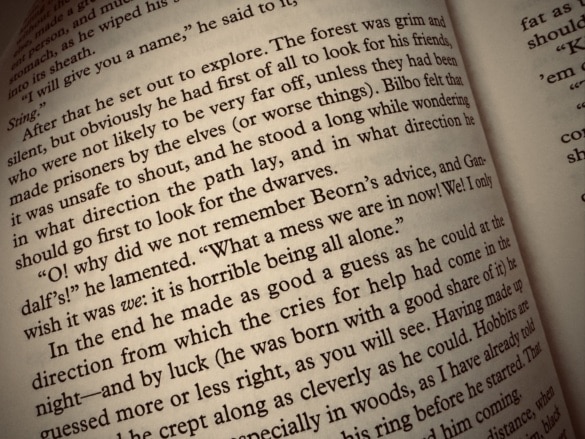We Not Me
I love a good story, but how that story is told is of great importance to me. There are some authors who just have a way of writing. When you read them you know that what is in front of you is special. I feel that way about J. R. R. Tolkien. His books The Hobbit and The Lord of the Rings are fantastic tales. They really check off a lot of boxes for people who love fiction. The way he writes those stories, though, are exceptionally unique—not able to be copied or replicated by another.
One of the neatest features of these particular two tales is Tolkien’s choice for main characters. Like many authors, Tolkien has a central protagonist that receives the most focus. Surrounding that person is a cast of supporting characters who border on being quite central themselves, and this makes the story quite large and entertaining.
In the book The Hobbit, the main character is Bilbo Baggins. Mr. Baggins is whisked away into a grand adventure much larger than himself or anything he has ever known. He’s pulled and stretched, challenged and grown through various trials and predicaments. On his journey he travels with a band of dwarves and a wizard that become his friends (if not family). Throughout the story there is the glaring detail that these characters are on this adventure together. They are constantly supporting each other, admitting all along the way that they need each other in order to accomplish the task at hand. They just can’t do it alone. This is a theme for all of Tolkien’s books that deal with the world he named “middle-earth”.
In the picture I took from my copy of The Hobbit just below, Mr. Baggins is trapped in a terrible forest that is plaguing the company. Each of the dwarves and Bilbo are suffering from the darkness of the Mirkwood, a forest filled with mischief and trickery. At one point in chapter 8, Bilbo is separated from the others. Confused and alone he exclaims, “What a mess we are in now! We! I only wish it was we: it is horrible being all alone.” Bilbo has already had one misadventure where he faced a dreadful character named Gollum by himself. That experience was enough, and to be in the situation he is in now is quite depressing as he wishes he had his company by his side.

A page from The Hobbit, chapter 8, “Flies and Spiders”
“Two are better than one, because they have a good return for their labor: If either of them falls down, one can help the other up. But pity anyone who falls and has no one to help them up. Also, if two lie down together, they will keep warm. But how can one keep warm alone? Though one may be overpowered, two can defend themselves. A cord of three strands is not quickly broken.” —Ecclesiastes 4:9-12 NIV
The writer of Ecclesiastes understands the importance of being sure that we live life together. As someone who is part of a kingdom that is to reflect God, it is crucial to the success of the kingdom that we be together in our efforts. The we is what God’s people have been called to be. We bring our individual gifts to the greater body in order to be a community called by God (1 Corinthians 12.12). Our individuality takes a backseat to the calling because our individual gifts are brought together to serve the larger mission. Our identity, then, becomes more corporate and less individual.
The words above are quite scandalous to many in today’s world. Though our country is learning to serve the greater good and become more utilitarian (see definition 1 at the link), we still have much to learn about the we, and that will be a hard lesson for those who continue to worship the me.
Bilbo wanted the we back. The Mirkwood forest had been planting individual thoughts and wants into the minds of each of the company, droving each of them to think about the me which then separated them from each other—the we. When Jesus was tempted by the devil in the desert, the devil was trying to get Jesus to focus on Himself (Matthew 4.1-11). But Jesus continued to glorify the Father. That’s because it’s all about God. Life was never to be about the me. Only when the we comes together to serve God alone can we accomplish God’s will and please Him. God’s desire is that we would be a community, and even more a kingdom, that collectively worships Him.
As you live out your faith, don’t get caught focusing on yourself, as that will isolate you from God and others. Your faith will struggle because you can’t get past yourself. And even if you come together with others, be sure you are serving and worshiping God and not your ideas or opinions. It was collective pride that destroyed the people of Babel because it became about them and not about Him (Genesis 11.1-9).
Stay close to others.
Live out your faith with one another.
There is strength in the community.
Let it be about the we, not the me.
—Pastor Whit
Read more inspirational messages regarding faith by checking out past Whitt’s End articles.







